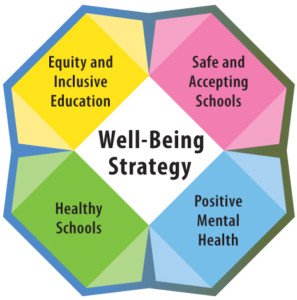A healthy school climate leads to greater student success.
The Waterloo Region District School Board is committed to providing students with a positive school climate.
School climate includes:
- Learning environment
- Relationships among the students, parents/guardians and school staff
- School safety
- School building and physical surroundings
A healthy school climate leads to greater student success. Parents and guardians play a key role by advocating for the well-being of their children.
Well-Being
There are four key components at the foundation of Ontario’s well-being strategy:

The Ministry of Education has four key components as part of the well-being strategy.
- Positive Mental Health
- Safe and Accepting Schools
- Healthy Schools
- Equity and Inclusive Education
1. Positive Mental Health
The WRDSB recognizes the clear relationship between student well-being and academic success. We know that mental wellness is a condition for learning. When we attend to student wellness in our school system and within our classrooms, students have a greater opportunity to reach their academic and social emotional potential. The WRDSB is committed to the Mental Health Strategy to support mental health and well-being as it provides direction to support the overall health and wellness of our organization.
2. Safe and Accepting Schools
The WRDSB sets out expectations for all schools to provide safe, caring, inclusive and accepting learning environments that support the achievement and well-being of each and every student. These expectations include addressing bullying, implementing progressive discipline and creating a positive school climate.
In order to help parents and guardians understand bullying and how it is addressed in our schools, the Government of Ontario has created a guide for parents, available on their website. Resources are also available in multiple languages. For specific information regarding how bullying is addressed withing the WRDSB please review Administrative Procedure 1200 – Student Bullying Prevention and Intervention.
Roles and responsibilities with respect to reports of bullying:
- Students and/or parents and guardians are encouraged to report to any school staff person with whom they feel comfortable.
- Staff must report to the principal if they observe bullying or if they receive a report of bullying.
- Principals must investigate any report of bullying received.
- Principals must contact parents and guardians regarding the nature of the harm to their child and the steps being taken to keep their child safe, including the nature of the discipline in response to the incident.
WRDSB Policy 6008 – Student Discipline speaks to how bullying and other infractions will be addressed in our schools.
3. Healthy Schools
Schools that are healthy foster healthy active lifestyles within their students. They have staff members who attend to the students’ cognitive, emotional, social and physical development, but also promote students’ positive mental health, resilience and overall state of well-being. All educators are expected to create learning environments that support all of these student needs.
4. Equity and Inclusion
An equitable and inclusive education is one that is based on the principles of acceptance and inclusion of everyone, regardless of race, ancestry, place of origin, colour, ethnic origin, citizenship, creed (religion), sex, sexual orientation, gender identity, gender expression, age, marital status, family status, socioeconomic status or disability. At the WRDSB, we strive to identify and remove discriminatory biases and systemic barriers in order to support student achievement and well-being.
Parent and Guardian Concerns and Supports
If you have reported concerns regarding bullying or other mistreatments to the school and have not heard anything back, please take into account that the school may still be working through the investigation. If you feel your child remains at risk, you should reach out once again to your child’s teacher or the principal. It is always in the best interests of your child to keep the lines of communication open between school and home.
In some circumstances, the school may find that bullying has not taken place, but there may be safety issues or treatment by others that is affecting the school climate for your child. Continue to work with the school until you are satisfied that your child’s well-being needs have been addressed.
Whether related to well-being or otherwise, if you do not feel satisfied with how your child is being supported at school, you may follow the steps outlined in Administrative Procedure 1410 – Parent Support.
Parents and guardians may contact the school principal or school board trustees to speak about the content of the board policies and procedures mentioned above.
Resources
WRDSB Safe, Caring and Inclusive Schools (SCIS)
Parent Involvement Committee (PIC) SCIS
Ministry of Education Well-Being
Administrative Procedure 1230 – Faith and religious Accommodation
WRDSB Mental Health and Well-Being
Ministry of Education Bullying and Cyber-Bullying (select your language and scroll down to find “Bullying We Can All Help Stop It”)
Board Policy 1008 – Equity and Inclusion

